- Solar advice hub
- Batteries
- What size solar battery do I need?
What size solar battery do I need?
Here's why it’s important to get the right size solar battery, and how your installer will choose a size that suits your home.


Why you can trust our content
We know that the solar industry is full of misinformation, but we only use reliable sources, including:
- Our experienced solar experts, installers and system designers
- Our own database of solar & battery system designs
- Authoritative bodies like MCS and the UK government



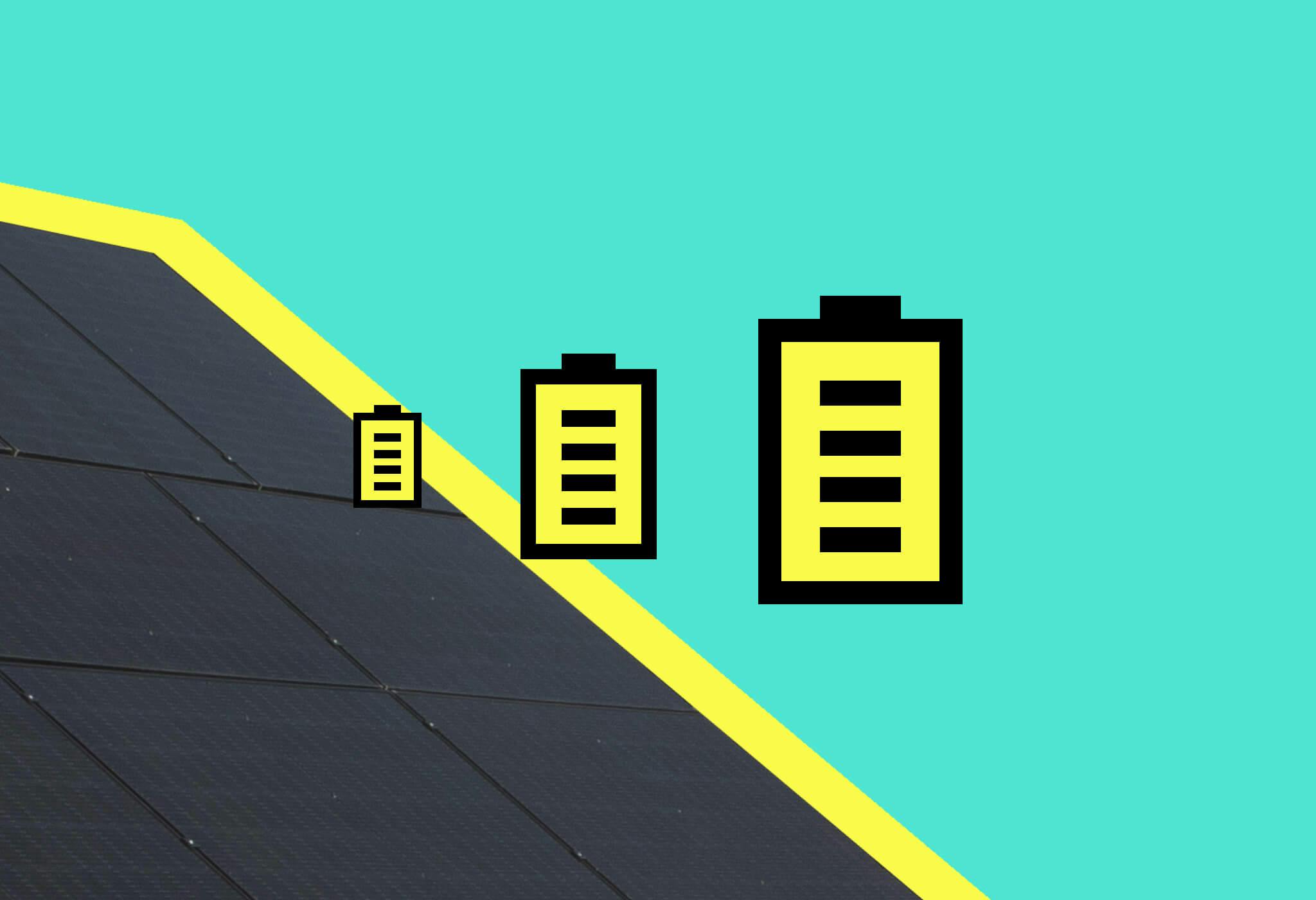
Solar battery sizing: at a glance
When you’re buying a solar battery, you want to get the right size for your home.
A system that’s too small will be overworked and end up with a reduced lifespan, while an oversized battery will be unnecessarily expensive.
If your installer chooses an appropriate model for your home, you can make the most of the electricity your panels generate without overpaying.
In this guide, we’ll explain why it’s important to get the right size of battery, how your installer will work out which size suits your home, and the range of sizes they’ll have at their disposal.
If you’re wondering how much a solar & battery system could save you, just answer a few quick questions below and we'll generate an estimate for you.
What size solar battery should you get?
There's no definitive 'ideal battery size' for everyone, as there are so many factors to take into account.
However, you can take the following estimates in this table as a rough indicator.
| Annual electricity consumption | Ideal battery size |
|---|---|
| Up to 5,000 | 4-5 |
| 5,000 - 10,000 | 9-10 |
| 10,000+ | 10+ |
The average UK annual household electricity consumption - known as your Estimated Annual Consumption (EAC) - is 3,400kWh, as of January 2024.
A three-bedroom household with an EAC of 3,400kWh and a 3.5kWp solar panel system on its roof will usually require around a 5kWh battery.
This battery is smaller than the home’s average daily usage of around 9-10kWh, which makes sense, since a large chunk of the household’s usage will come during the day, when its solar panels are producing electricity that can be used immediately.
Additionally, if you’ve signed up to a smart export tariff such as Intelligent Octopus Flux (IOF), your battery may discharge all its electricity to the grid in the peak window of 4-7pm, meaning you’ll need to use the grid to supply any electricity you need at night.
A 5kWh battery will suit most homes, but if your consumption is above around 5,000kWh, you may want to start thinking about getting a larger battery with roughly 9-10kWh of capacity.
And if your EAC is above a whopping 10,000kWh, that's when you should be looking at batteries larger than 10kWh.
If you want to start small but then increase your storage capacity later on, you should look for a battery with stackable modules. We discuss this in more detail near the end of the article.
What does ‘solar battery size’ actually mean?
A solar battery’s size is measured in kilowatt-hours (kWh), as it stores energy.
For example, if your solar panel system produces 7kWh on a given day and you use half of this electricity as its being generated, a 5kWh battery can comfortably store the remaining 3.5kWh.
However, a solar battery will only discharge to its depth of discharge (DoD) – that is, the maximum amount of its capacity you can use without putting it at risk.
For instance, a 5kWh battery with an 80% DoD should discharge 4kWh before needing to recharge.
You can increasingly find 100% DoD batteries which don’t come with any discharge limits, meaning the entirety of their capacity is usable.
Verified expertEvery battery has an internal management system that will automatically prevent someone from drawing power beyond its Depth of Discharge, so there’s never any danger of misusing a battery in this way.
Alfie Ireland
Head of Operations & Technical at Sunsave
Alfie has worked in green tech for over a decade. During his four years at OVO, he helped develop the world’s largest domestic vehicle-to-grid trial.
What’s the range of solar battery sizes?
Solar battery sizes range all the way from 1.2kWh to just under 3.3 million kWh – but neither of these are likely to suit your home.
Domestic solar batteries are usually sized between 2.4kWh and 15kWh, with larger batteries generally intended for industrial or commercial purposes, a large off-grid home, or to power a neighbourhood.
In fact, the great majority of UK households won’t need a battery with a capacity over 10kWh, unless they use more than around 6,000kWh of electricity per year.
You’ll most likely require a 5kWh battery, as this is sufficient for most homes with the national average EAC of 3,400kWh.
Why is it important to get the right size solar battery?
It’s crucial to get an appropriately sized solar battery so you can get the most out of your investment.
If you choose a battery that’s too big, you’ll probably end up paying a higher price for a machine that takes up extra space – all for no good reason.
And with a battery that’s too small, you may lose out on hundreds or thousands of pounds in savings.
The main advantage of a battery is it allows you to increase your self-consumption – that is, the amount of your own solar electricity you use – by enabling you to run your home on solar after the sun goes down.
This means you don’t have to be home all day to fully utilise your panels – so don’t restrict yourself by getting a small one.
Verified expertGetting the right size storage battery for your solar panels is very important. The key factor to consider is your annual electricity usage, but there are lots of other things to think about too. At Sunsave, our solar experts will analyse your needs closely before suggesting a specific battery size, so you don’t need to worry about working it out yourself.
Alfie Ireland
Head of Operations & Technical at Sunsave
Alfie has worked in green tech for over a decade. During his four years at OVO, he helped develop the world’s largest domestic vehicle-to-grid trial.
How to work out what size solar battery you need
A qualified solar panel installer should work out what size of solar battery you need, so this shouldn’t be left up to you – but it’s good to at least know how they’ll make their decision.
Here are the most important factors your installer will consider to work out which size of battery best suits your home.
- How big your solar PV system is
- How much electricity you use
- Whether your electricity usage is going to increase
- Which import and export tariffs you sign up for
- How much space you have
Here's a bit more detail on each factor.
1. How big your solar PV system is
The larger the solar panel system, the more electricity it’ll produce, which allows you to replace more grid electricity with your own free, clean supply – as long as you have a suitably sized battery.
For example, after the sun sets, your 12kWp system will only be as useful as your battery’s capacity – and if it taps out at 2kWh, that’s how much free electricity you have for the night.
On the flip side, there’s no need to get a big battery if your solar panels are only capable of producing a small amount of electricity every day.
Fortunately, your panels will generate electricity at a roughly consistent rate from year to year (unless you do something dramatic like chopping down an overhanging tree), so this part of the calculation should be easy enough.
2. How much electricity you use
To work out what size of solar battery your household needs, your installer has to know how much electricity you typically use per year.
After all, even if you’re getting a large solar panel system, there’s no use buying a big battery if your consumption is relatively low.
They should also ask when you’re usually home, so they know how much solar electricity will likely be used during the day, and how much needs to be saved for after the sun goes down.
If you and the people you live with barely spend any time at home in the daytime, you may need a larger battery – whereas if you stay home all day and go to bed early, you might require a smaller battery.
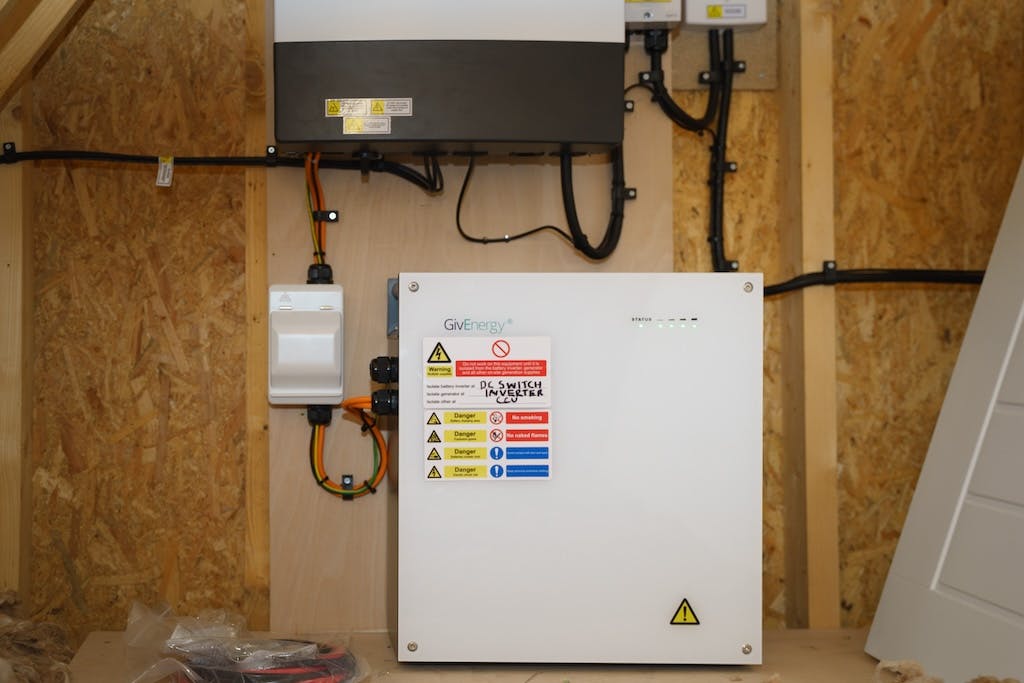
3. Whether your electricity usage is going to increase
Make sure you tell your installer if you’re anticipating any changes that could increase your consumption, as they’ll need to factor these into their calculations.
This may apply to you if you’re thinking of adding a piece of technology that will require significantly more electricity, such as a heat pump or electric car.
If you’re planning to add another member or two to your household in the next few years, this could also increase the amount of electricity you require.
In this case, you’ll need a bigger machine – though bear in mind that batteries typically last 10-12 years, so don’t plan too far into the future.
Fortunately, Sunsave Plus can counteract your battery’s short lifespan by providing a free replacement as soon as it performs at less than 70% of its original capacity, as part of the Sunsave Guarantee.
This 20-year aftercare and support package, which automatically comes with Sunsave Plus, also supplies you with a free inverter replacement whenever it’s required – which is usually around the same time as the battery needs replacing.
And if any part of your system stops working or even drops below an acceptable performance level over the course of your subscription, we’ll come and fix it.
We’ll monitor your system 24/7, alert you if anything goes wrong, troubleshoot the issue, and compensate you for any extended period that your system isn’t working as it should.

The UK's first solar subscription
- No upfront cost
- Fixed monthly fee
- 20-year Sunsave Guarantee
4. Which import and export tariffs you sign up for
Every solar & battery system owner should sign up for an export tariff, as it means you get paid for the electricity that you export to the grid.
However, the tariff you choose could have a significant bearing on the size of battery you should get.
There are now tariffs that offer identical import and export rates (such as Intelligent Octopus Flux), which means Octopus pay you the same for a kWh of your solar electricity as you pay for a kWh of Octopus’s grid electricity.
This takes away all the pressure to use as much of your solar electricity as possible instead of sending it to the grid, since you’ll save the same amount by consuming it as you would make by selling it.
As a result, it’s less important to get a large battery if you’re on IOF – though if you’re planning to increase your consumption in the coming years, it may still be a good idea.
There are also import tariffs that offer a very low overnight rate (such as British Gas Electric Driver), which you can use to charge up your battery overnight, and then use your battery to power your home throughout the following day and evening. Meanwhile, you can just export most of the electricity that your solar panels generate. In this case, it could be wiser to get a larger battery.
At Sunsave, we make sure every customer is on the best import and export tariff for their situation, and we design a solar & battery system that suits their needs.
5. How much space you have
Most households will be able to find a suitable place to fit an appropriately sized battery, but it’s still worth checking that you have enough space before you buy.
Your installer should only use the loft if it has a big enough hatch and a gable end wall where the battery can be mounted.
If you decide against putting the battery in your loft, it’s best to avoid any escape routes that could be used in the event of a fire, which may mean excluding hallways and landings.
A garage or a spot on the outside of your home is generally ideal – and if not, a cupboard under the stairs will do.
This is all according to the latest guidance in the Publicly Available Specification (PAS) 63100 and the Institution of Engineering and Technology Code of Practice of Electrical Energy Storage Systems.
How big are solar batteries?
In terms of physical dimensions, a 5kWh storage battery is usually around:
- 575mm tall,
- 480mm wide,
- 183mm deep.
These figures are based on an average of four different ~5kWh batteries, produced by four major manufacturers.
As previously mentioned, a 5kWh battery should be suitable for the majority of households in the UK.
However, if you scale up to a 10kWh battery, the usual dimensions increase to around:
- 909mm tall,
- 600mm wide,
- 221mm deep.
Again, these figures are based on an average of four different ~10kWh batteries, produced by four major manufacturers.
The best location for a battery is in your garage or outside, as per the latest guidelines in the Publicly Available Specification (PAS) 63100. However, if you want to install a battery in your loft, this is still possible, but it will need to be able to fit through your loft hatch and be mounted on a gable end wall.
Should you get a larger battery?
You can always go with a battery that just about serves your basic needs – or you can get a bigger model, and take advantage of all the financial benefits on offer.
You’ll be able to store more of the electricity your solar panels produce, allowing you to drive down your energy bills even further.
And thanks to smart solar tariffs, you can also use your battery as a profit-making machine that imports grid electricity when it’s cheap, and sells it back when the rate shoots up. The bigger the battery, the larger your profits.
A larger battery will also soften the blow of energy price rises, and prepare you for a future that’s likely to be more reliant on electricity – whether that includes an electric car, heat pump, air conditioning, or new additions to your household.
To find out more, check out our full guide: 5 reasons to get a larger storage battery.
Can you increase your solar battery capacity later on?
The best way to increase your storage battery capacity at a later stage is to choose a manufacturer with 'stackable' modules. These are designed to slot into your existing system and increase its capacity by a relatively small increment each time, usually around 2kWh.
This means you can start with two or three modules, and then easily add more as your electricity needs grow.
If you don't opt for stackable modules, it can make things a bit tricker in the long run if you ever want to boost your capacity.
You'll have to uninstall your existing battery and install a larger one, although this will have to be the same brand as your inverter (unless you replace your inverter as well).
And replacing your battery later on will be more expensive than having the right size battery installed in the first place.
If you don't want a large battery now, but you expect your electricity needs to increase in the future, we recommend stackable modules.
What happens if your solar battery is too small?
If your solar battery is too small for your household, it’ll perform more cycles than a correctly sized model would.
This is bad for a battery’s health, as they’re typically only meant to cycle once or twice per day.
It may experience some unnecessary wear and tear as a result, and it’ll likely have a shorter lifespan.
Most batteries come with a warranty that includes a set number of cycles. When your battery’s used them all up, you won’t be covered, and the model is likely to decline relatively quickly after that.
Next steps
Most UK households will require a roughly 5kWh solar battery, while homes with very high electricity usage should look at getting a battery sized around 10kWh.
You should generally leave it up to an installer, who’ll size your battery according to your solar panel system’s capacity, the space available in your home, and by carefully considering your current and future electricity consumption.
And if their recommendation sounds wrong, you can always ask other installers to perform the same calculations, just in case.
If you’re wondering how much a properly installed solar & battery system could save you, just answer a few quick questions below and we’ll provide you with an estimate.
Solar battery sizing: FAQs
Related articles
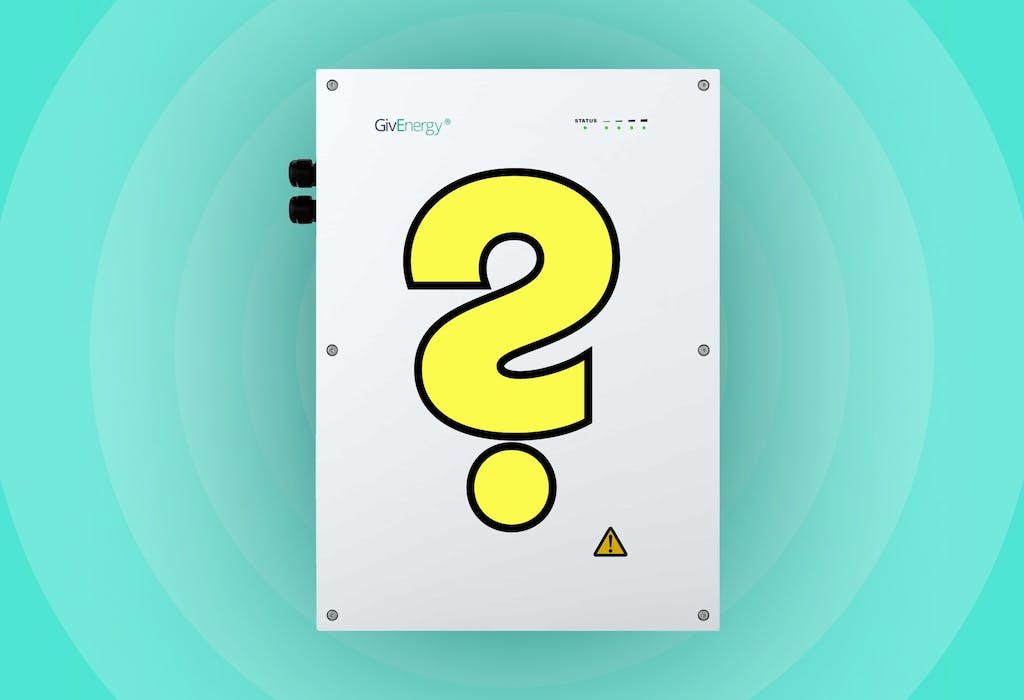
Solar battery storage: is it worth it?
Read full story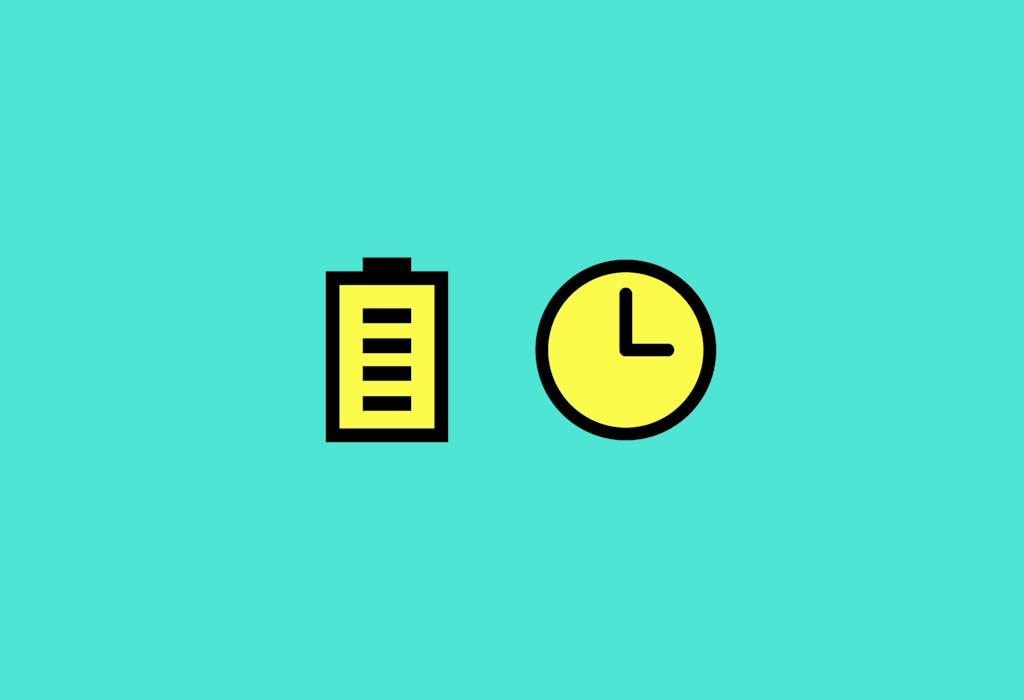
How long do solar batteries last?
Read full story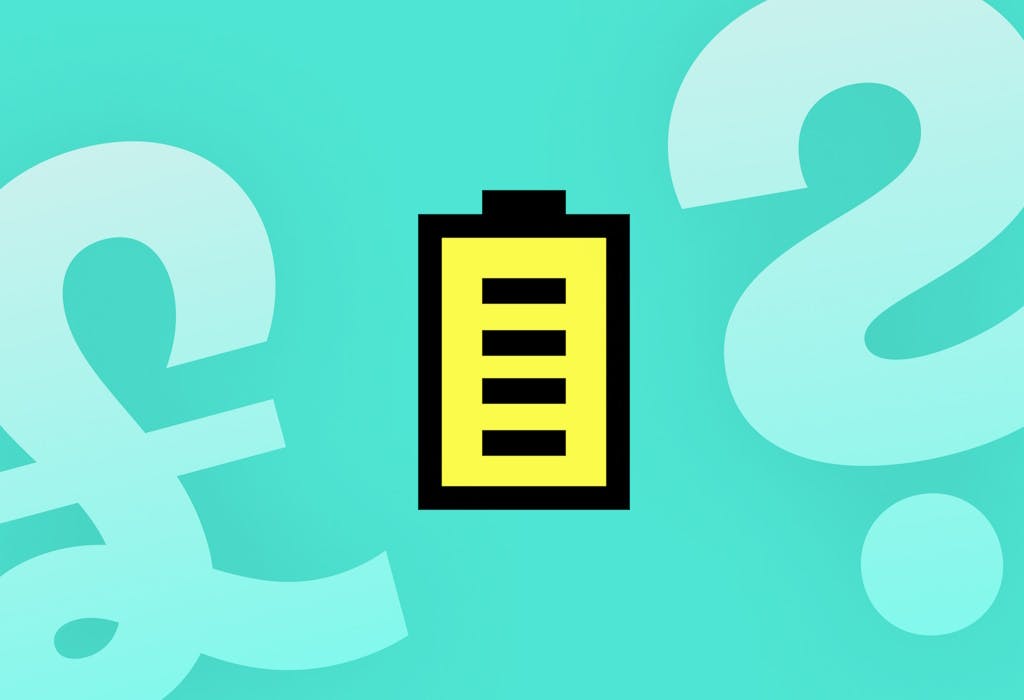
How much does a solar battery cost in the UK?
Read full story
How many solar panels do I need?
Read full story
Written byJosh Jackman
Josh has written about the rapid rise of home solar for the past six years. His data-driven work has been featured in United Nations and World Health Organisation documents, as well as publications including The Eco Experts, Financial Times, The Independent, The Telegraph, The Times, and The Sun. Josh has also been interviewed as a renewables expert on BBC One’s Rip-Off Britain, ITV1’s Tonight show, and BBC Radio 4 and 5.
